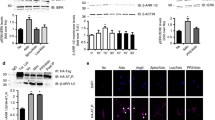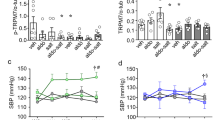Abstract
Aldosterone (Aldo), a pivotal hormone that is ubiquitously expressed in systemic tissues of mammals, is a crucial factor in the pathogenesis of cardiac disease. Accumulating evidence suggests that disturbances in cell energy metabolism are involved in increasing aldosterone levels. However, the precise mechanism underlying the impact of cardiac metabolic remodeling underlying aldosterone stimulation remains limited. In this work, we evaluated the underlying effect of aldosterone on regulating cardiac metabolism remodeling in a canine model. Fifteen beagle dogs were divided into a control group (n = 5), Aldo group (n = 5), and a group treated with spironolactone (SP), a mineralocorticoid receptor antagonist (n = 5), for 4 weeks. Blood pressure, electrocardiogram and respiratory parameters, H&E, Masson staining, ultrastructural changes, the adenosine triphosphate (ATP) and free fatty acid (FFA) levels of ventricular tissues, the level of mRNA, and the protein expression of key metabolic factors and regulators were assessed. The Sirt1/AMPK signaling pathway was significantly inhibited in the canine model of aldosterone stimulation, resulting in a reduction of the key downstream metabolic factors involved in glucose and fatty acid oxidation. The dysregulation of expression of key factors in glycogen metabolism led to glycogen deposition, an increase in FFA levels, a reduction in ATP levels, apoptosis, inflammatory cell infiltration, and mitochondrial damage in the ventricular myocardium. These effects were significantly restored by spironolactone. Aldosterone stimulation induced cardiac metabolic remodeling in ventricular cardiomyocytes possibly through the Sirt1/AMPK signaling pathway, implying that this pathway may provide a novel therapeutic target for cardiac metabolic remodeling.








Similar content being viewed by others
References
Ball JP, Syed M, Maranon RO, Hall ME, Kc R, Reckelhoff JF et al (2017) Role and regulation of MicroRNAs in aldosterone-mediated cardiac injury and dysfunction in male rats. Endocrinology 158:1859–1874
Bell SP, Adkisson DW, Lawson MA, Wang L, Ooi H, Sawyer DB, Kronenberg MW (2014) Antifailure therapy including spironolactone improves left ventricular energy supply-demand relations in nonischemic dilated cardiomyopathy. J Am Heart Assoc 3
Bertero E, Maack C (2018) Metabolic remodelling in heart failure. Nat Rev Cardiol
Bienvenu LA, Morgan J, Rickard AJ, Tesch GH, Cranston GA, Fletcher EK, Delbridge LMD, Young MJ (2012) Macrophage mineralocorticoid receptor signaling plays a key role in aldosterone-independent cardiac fibrosis. Endocrinology 153:3416–3425
Brunet A, Sweeney LB, Sturgill JF, Chua KF, Greer PL, Lin Y, Tran H, Ross SE, Mostoslavsky R, Cohen HY, Hu LS, Cheng HL, Jedrychowski MP, Gygi SP, Sinclair DA, Alt FW, Greenberg ME (2004) Stress-dependent regulation of FOXO transcription factors by the SIRT1 deacetylase. Science (New York, NY) 303:2011–2015
Cannavo A, Liccardo D, Eguchi A, Elliott KJ, Traynham CJ, Ibetti J, Eguchi S, Leosco D, Ferrara N, Rengo G, Koch WJ (2016) Myocardial pathology induced by aldosterone is dependent on non-canonical activities of G protein-coupled receptor kinases. Nat Commun 7:10877
Chen W, Li F, He C, Zhu Y, Tan W (2014) Elevated prevalence of abnormal glucose metabolism in patients with primary aldosteronism: a meta-analysis. Ir J Med Sci 183:283–291
Fallo F, Veglio F, Bertello C, Sonino N, Della Mea P, Ermani M, Rabbia F, Federspil G, Mulatero P (2006) Prevalence and characteristics of the metabolic syndrome in primary aldosteronism. J Clin Endocrinol Metab 91:454–459
Fan YY, Kohno M, Hitomi H, Kitada K, Fujisawa Y, Yatabe J, Yatabe M, Felder RA, Ohsaki H, Rafiq K, Sherajee SJ, Noma T, Nishiyama A, Nakano D (2011) Aldosterone/mineralocorticoid receptor stimulation induces cellular senescence in the kidney. Endocrinology 152:680–688
Gamliel-Lazarovich A, Raz-Pasteur A, Coleman R, Keidar S (2013) The effects of aldosterone on diet-induced fatty liver formation in male C57BL/6 mice: comparison of adrenalectomy and mineralocorticoid receptor blocker. Eur J Gastroenterol Hepatol 25:1086–1092
Gu XS, Wang ZB, Ye Z, Lei JP, Li L, Su DF, Zheng X (2014) Resveratrol, an activator of SIRT1, upregulates AMPK and improves cardiac function in heart failure. Genetics and molecular research : GMR 13:323–335
Harada M, Tadevosyan A, Qi X, Xiao J, Liu T, Voigt N, Karck M, Kamler M, Kodama I, Murohara T, Dobrev D, Nattel S (2015) Atrial fibrillation activates AMP-dependent protein kinase and its regulation of cellular calcium handling: potential role in metabolic adaptation and prevention of progression. J Am Coll Cardiol 66:47–58
Hirata A, Maeda N, Hiuge A, Hibuse T, Fujita K, Okada T, Kihara S, Funahashi T, Shimomura I (2009) Blockade of mineralocorticoid receptor reverses adipocyte dysfunction and insulin resistance in obese mice. Cardiovasc Res 84:164–172
Huby AC, Antonova G, Groenendyk J, Gomez-Sanchez CE, Bollag WB, Filosa JA, de Chantemèle EJB (2015) Adipocyte-derived hormone leptin is a direct regulator of aldosterone secretion, which promotes endothelial dysfunction and cardiac fibrosis. Circulation 132:2134–2145
Ingelsson E, Pencina MJ, Tofler GH, Benjamin EJ, Lanier KJ, Jacques PF, Fox CS, Meigs JB, Levy D, Larson MG, Selhub J, D’Agostino RB Sr, Wang TJ, Vasan RS (2007) Multimarker approach to evaluate the incidence of the metabolic syndrome and longitudinal changes in metabolic risk factors: the Framingham Offspring Study. Circulation 116:984–992
Johar S, Cave AC, Narayanapanicker A, Grieve DJ, Shah AM (2006) Aldosterone mediates angiotensin II-induced interstitial cardiac fibrosis via a Nox2-containing NADPH oxidase. FASEB J 20:1546–1548
Kakinuma Y, Miyauchi T, Yuki K, Murakoshi N, Goto K, Yamaguchi I (2000) Mitochondrial dysfunction of cardiomyocytes causing impairment of cellular energy metabolism induces apoptosis, and concomitant increase in cardiac endothelin-1 expression. J Cardiovasc Pharmacol 36:S201–S204
Kato T, Niizuma S, Inuzuka Y, Kawashima T, Okuda J, Tamaki Y, Iwanaga Y, Narazaki M, Matsuda T, Soga T, Kita T, Kimura T, Shioi T (2010) Analysis of metabolic remodeling in compensated left ventricular hypertrophy and heart failure. Circ Heart Fail 3:420–430
Kidambi S, Kotchen JM, Grim CE, Raff H, Mao J, Singh RJ, Kotchen TA (2007) Association of adrenal steroids with hypertension and the metabolic syndrome in blacks. Hypertension (Dallas, Tex : 1979) 49:704–711
Lacolley P, Safar ME, Lucet B, Ledudal K, Labat C, Benetos A (2001) Prevention of aortic and cardiac fibrosis by spironolactone in old normotensive rats. J Am Coll Cardiol 37:662–667
Liu GZ, Hou TT, Yuan Y, Hang PZ, Zhao JJ, Sun L, Zhao GQ, Zhao J, Dong JM, Wang XB, Shi H, Liu YW, Zhou JH, Dong ZX, Liu Y, Zhan CC, Li Y, Li WM (2016) Fenofibrate inhibits atrial metabolic remodelling in atrial fibrillation through PPAR-alpha/sirtuin 1/PGC-1alpha pathway. Br J Pharmacol 173:1095–1109
Loffing J, Korbmacher C (2009) Regulated sodium transport in the renal connecting tubule (CNT) via the epithelial sodium channel (ENaC). Pflugers Arch Eur J Physiol 458:111–135
Lohmeier TE, Liu B, Hildebrandt DA, Cates AW, Georgakopoulos D, Irwin ED (2015) Global- and renal-specific sympathoinhibition in aldosterone hypertension. Hypertension (Dallas, Tex : 1979) 65:1223–1230
Luther JM, Luo P, Kreger MT, Brissova M, Dai C, Whitfield TT, Kim HS, Wasserman DH, Powers AC, Brown NJ (2011) Aldosterone decreases glucose-stimulated insulin secretion in vivo in mice and in murine islets. Diabetologia 54:2152–2163
Mummidi S, Das NA, Carpenter AJ, Kandikattu H, Krenz M, Siebenlist U, Valente AJ, Chandrasekar B (2016) Metformin inhibits aldosterone-induced cardiac fibroblast activation, migration and proliferation in vitro, and reverses aldosterone+salt-induced cardiac fibrosis in vivo. J Mol Cell Cardiol 98:95–102
Nadtochiy SM, Urciuoli W, Zhang J, Schafer X, Munger J, Brookes PS (2015) Metabolomic profiling of the heart during acute ischemic preconditioning reveals a role for SIRT1 in rapid cardioprotective metabolic adaptation. J Mol Cell Cardiol 88:64–72
Ndisang JF, Lane N, Jadhav A (2009) The heme oxygenase system abates hyperglycemia in Zucker diabetic fatty rats by potentiating insulin-sensitizing pathways. Endocrinology 150:2098–2108
Selvaraj J, Muthusamy T, Srinivasan C, Balasubramanian K (2009) Impact of excess aldosterone on glucose homeostasis in adult male rat. Clin Chim Acta 407:51–57
Selvaraj J, Sathish S, Mayilvanan C, Balasubramanian K (2013) Excess aldosterone-induced changes in insulin signaling molecules and glucose oxidation in gastrocnemius muscle of adult male rat. Mol Cell Biochem 372:113–126
Sun L, Zhang S, Yu C, Pan Z, Liu Y, Zhao J, Wang X, Yun F, Zhao H, Yan S, Yuan Y, Wang D, Ding X, Liu G, Li W, Zhao X, Liu Z, Li Y (2015) Hydrogen sulfide reduces serum triglyceride by activating liver autophagy via the AMPK-mTOR pathway. Am J Phys Endocrinol Metab 309:E925–E935
Takeda M, Tatsumi T, Matsunaga S, Hayashi H, Kimata M, Honsho S et al (2007) Spironolactone modulates expressions of cardiac mineralocorticoid receptor and 11beta-hydroxysteroid dehydrogenase 2 and prevents ventricular remodeling in post-infarct rat hearts. Hypertens Res 30:427–437
Tsurutani Y, Sugisawa C, Ishida A, Inoue K, Saito J, Omura M, Nagasaka S, Nishikawa T (2017) Aldosterone excess may inhibit insulin secretion: a comparative study on glucose metabolism pre- and post-adrenalectomy in patients with primary aldosteronism. Endocr J 64:339–346
Vaziri H, Dessain SK, Ng Eaton E, Imai SI, Frye RA, Pandita TK et al (2001) hSIR2(SIRT1) functions as an NAD-dependent p53 deacetylase. Cell 107:149–159
Wada T, Ohshima S, Fujisawa E, Koya D, Tsuneki H, Sasaoka T (2009) Aldosterone inhibits insulin-induced glucose uptake by degradation of insulin receptor substrate (IRS) 1 and IRS2 via a reactive oxygen species-mediated pathway in 3T3-L1 adipocytes. Endocrinology 150:1662–1669
Wang J, Song Y, Li H, Shen Q, Shen J, An X, Wu J, Zhang J, Wu Y, Xiao H, Zhang Y (2016a) Exacerbated cardiac fibrosis induced by beta-adrenergic activation in old mice due to decreased AMPK activity. Clin Exp Pharmacol Physiol 43:1029–1037
Wang P, Xu L, Sun A (2016b) Energy remodeling, mitochondrial disorder and heart failure. Curr Pharm Des 22:4823–4829
Webster BR, Lu Z, Sack MN, Scott I (2012) The role of sirtuins in modulating redox stressors. Free Radic Biol Med 52:281–290
Xiao J, Sheng X, Zhang X, Guo M, Ji X (2016) Curcumin protects against myocardial infarction-induced cardiac fibrosis via SIRT1 activation in vivo and in vitro. Drug Des Devel Ther 10:1267–1277
Yuan Y, Chen Y, Zhang P, Huang S, Zhu C, Ding G, Liu B, Yang T, Zhang A (2012a) Mitochondrial dysfunction accounts for aldosterone-induced epithelial-to-mesenchymal transition of renal proximal tubular epithelial cells. Free Radic Biol Med 53:30–43
Yuan Y, Huang S, Wang W, Wang Y, Zhang P, Zhu C, Ding G, Liu B, Yang T, Zhang A (2012b) Activation of peroxisome proliferator-activated receptor-gamma coactivator 1alpha ameliorates mitochondrial dysfunction and protects podocytes from aldosterone-induced injury. Kidney Int 82:771–789
Zhang Y, Zhang S, Liu Z, Zhao X, Yuan Y, Sheng L, Li Y (2018) Resveratrol prevents atrial fibrillation by inhibiting atrial structural and metabolic remodeling in collagen-induced arthritis rats. Naunyn Schmiedeberg's Arch Pharmacol 391:1179–1190
Zhao J, Li J, Li W, Li Y, Shan H, Gong Y, Yang B (2010) Effects of spironolactone on atrial structural remodelling in a canine model of atrial fibrillation produced by prolonged atrial pacing. Br J Pharmacol 159:1584–1594
Funding
This work was supported by grants from the National Nature Scientific Foundation of China (No. 81700305, No. 81300133, No. 81470462), the Fundamental Research Funds for the Provincial Universities (2017LCZX09), the Heilongjiang Provincial Youth Innovative Talent Training Program, and the Research Funds from the First Affiliated Hospital of Harbin Medical University (2017B006).
Author information
Authors and Affiliations
Contributions
Guang Zhong Liu, Song Zhang, and Yue Li designed and conducted the experiment; Guang Zhang Liu and Song Zhang analyzed the data and wrote the manuscript. Yan Yan Li, Yong Wu Liu, Yun Zhang, Bo Xin Zhao, Yue Yuan, Jia-wei Zhang, and Zulfiia Khannanova conducted the experiments. Guang Zhong Liu, Song Zhang, and Yue Li revised the manuscript; and all authors approved the final version of the manuscript.
Corresponding author
Ethics declarations
Ethical approval
Animal procedures in the present study were approved by the Animal Care and Use Committee of Harbin Medical University, and conducted in accordance with the Guide for the Care and Use of Laboratory Animals published by US National Institutes of Health (NIH Publication No. 85-23, revised 2011).
Conflict of interest
The authors declare that they have no conflicts of interest.
Additional information
Publisher’s note
Springer Nature remains neutral with regard to jurisdictional claims in published maps and institutional affiliations.
Rights and permissions
About this article
Cite this article
Liu, Gz., Zhang, S., Li, Yy. et al. Aldosterone stimulation mediates cardiac metabolism remodeling via Sirt1/AMPK signaling in canine model. Naunyn-Schmiedeberg's Arch Pharmacol 392, 851–863 (2019). https://doi.org/10.1007/s00210-019-01641-2
Received:
Accepted:
Published:
Issue Date:
DOI: https://doi.org/10.1007/s00210-019-01641-2




